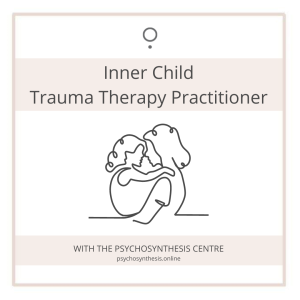
Internal Family Systems (IFS) is a transformative and life-changing approach to heal from early childhood trauma, that has garnered considerable attention and recognition in recent years. While it may appear to have achieved a cult-like status, it is crucial to recognise that IFS is not a completely new concept. It can be traced back to the roots of Psychosynthesis, a psycho-spiritual psychology, and its founder, Roberto Assagioli’s subpersonality model. This model serves as one of the core personality frameworks employed by Psychosynthesis psychotherapists, and has done so for the last 50 + years! By understanding the connections between these models, we can appreciate the foundation upon which IFS stands.
What is Internal Family Systems (IFS)?
Internal Family Systems is a therapeutic framework developed by author of, “No Bad Parts”, Richard Schwartz, Ph.D., that recognises and engages with the multiplicity of our inner world. It views our psychological landscape as comprised of various “parts”, each with its unique thoughts, feelings, beliefs, needs and desires. These parts can be considered as distinct characters within us, each playing a role in shaping our behaviour, emotions, and overall well-being.
In Internal Family Systems, the term “parts” refers to the various aspects of our personality, emotions, memories, and experiences. These parts can range from protective mechanisms and coping strategies to wounded inner children and even the essence of our authentic self. They emerge as a result of past experiences, trauma, and conditioning, often with the intention of safeguarding us from pain or harm.
Key Principles of Internal Family Systems
- Self-Leadership: Just as in Psychosynthesis, the central concept in IFS is the notion of the Self, which represents the core of our being and possesses qualities such as curiosity, compassion, and calmness. The goal of IFS therapy is to help individuals access and strengthen their Self, allowing it to become the leader of their inner system. When the Self is empowered, it can facilitate healing and harmony among the various parts.
- Multiplicity of Parts: IFS recognises that we are composed of multiple parts, each with its own distinct experiences, emotions, and beliefs. These parts can be categorised as exiles, managers, and firefighters. Exiles carry the emotional burdens of past traumas, while managers strive to maintain control and prevent further pain. Firefighters, on the other hand, emerge in response to intense emotions and aim to distract or numb us from distress. IFS helps individuals develop a compassionate and understanding relationship with these parts, fostering internal harmony and integration.
- Unburdening and Healing: IFS focuses on creating a safe and non-judgmental space for individuals to explore their inner world. By acknowledging and engaging with their parts, individuals can begin a process of unburdening and healing. This involves listening to the needs and concerns of each part, understanding their roles, and working towards resolving inner conflicts and restoring balance.
- Trauma-Informed Approach: IFS has proven to be particularly effective in working with trauma survivors and individuals with inner child wounds. By acknowledging and validating the experiences of wounded inner children, IFS provides a nurturing environment for healing and transformation. Through compassionate exploration, individuals can help their inner child parts find safety, release burdens, and reconnect with their innate resilience.
Internal Family Systems offers a powerful and compassionate approach to understanding and healing our inner world. By recognising the multiplicity of our parts and nurturing our authentic Self, we can create harmony, integration, and healing within ourselves. IFS provides a valuable framework to explore the depths of our being, to reconnect with our inner child, empowering us to live more authentic, fulfilling lives.
If you are ready to explore your Inner Child, join my mailing list to be notified of my upcoming Inner Child workshop for Trauma Warriors.
–
If you are a therapist ready to train in Inner Child Therapy, you can read more about my training for professionals at Psychosynthesis.Online.

